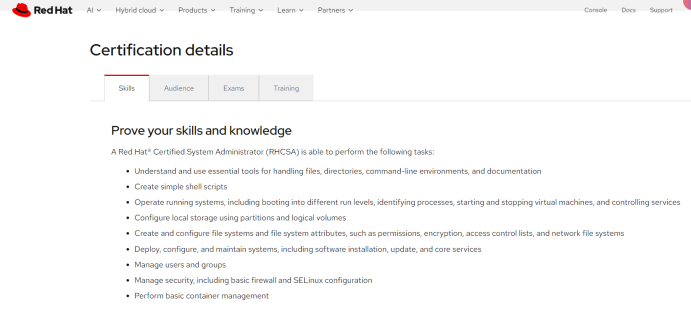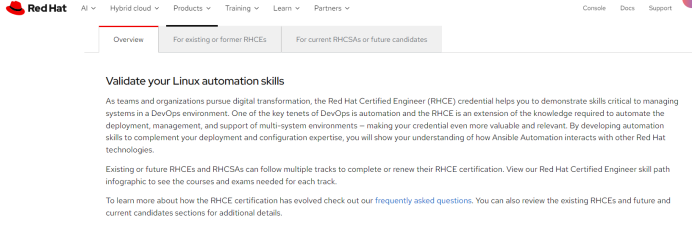A common question from Linux beginners is: “Is Red Hat certification really useful for Linux operations? Does it carry more weight than other certifications?”
As someone who has earned RHCE and helped many peers with certification planning, I’ll break down the definition, certification paths, value in the job market, and exam prep strategies. And instead of generic “training advice,” I’ll focus on how question banks and mock exams can help you prepare more effectively.

1. What is Red Hat Certification?
Red Hat certification is a professional Linux certification launched by Red Hat, designed as a hands-on, skill-oriented proof of ability.
Unlike certifications that focus on theory and multiple-choice questions, Red Hat exams are 100% practical. You are tested in a real Linux environment, solving actual problems — no memorization-only testing.
Having Red Hat certification proves that you are not just someone who “can memorize commands,” but an engineer who can apply Linux skills to real-world tasks. This is the core reason why the certification has high recognition in the IT industry.
2. Certification Levels
The Red Hat certification system has two core levels, each matching different skills and job requirements. Choosing the right level matters more than simply aiming for the highest.
RHCSA (Red Hat Certified System Administrator)
• Proves fundamental Linux administration skills.
• Covers installation, user and permission management, disk partitioning, and deploying basic services (Apache, Nginx, etc.).
• Suitable for beginners entering Linux operations or IT support staff wanting to strengthen Linux skills.
Our RHCSA dumps provides practice exams with command-line exercises, ensuring you master real operations instead of only reading notes.

RHCE (Red Hat Certified Engineer)
• Validates enterprise-level Linux administration.
• Builds on RHCSA and adds automation & high availability: managing servers with Ansible, writing Shell scripts, configuring keepalived for HA services.
• Essential for mid-level Linux administrators in enterprise environments.
Our RHCE dumps includes scenario-based simulations (automation, troubleshooting, HA setups), helping you prepare for the 4-hour hands-on exam with real-world exercises.

3. Why is Red Hat Certification Valuable?
The “value” of Red Hat certification comes from industry recognition and practical skill alignment, not marketing hype. Its gold-standard reputation rests on three pillars:
(1) High Employer Recognition
• Employers fear candidates who know theory but can’t work hands-on.
• Red Hat exams ensure certified engineers can deploy, troubleshoot, and automate systems independently.
• Over 80% of Linux job postings list RHCSA/RHCE as preferred, and many mid-level positions require RHCE.
• With the same experience, certified engineers typically earn 10–20% higher salaries.
(2) Transferable Skills, Not Version-Locked
• RHCSA and RHCE teach Linux fundamentals and universal skills (e.g. Ansible, Shell scripting), applicable across Red Hat, CentOS, Ubuntu, Debian, and more.
• The certification evolves with the industry — e.g. recent updates include Podman and cloud-native topics.
• This ensures your skills stay relevant and valuable long-term.
(3) High Barrier = High Value
• Red Hat exams are entirely practical, no rote memorization.
• Example: RHCE requires completing enterprise-grade tasks in 4 hours (service configuration, troubleshooting, automation).
• Pass rates are low:
• RHCSA: ~50–60%
• RHCE: ~40–50%
• Because you can’t “buy your way through,” the certification holds its weight in the market.
4. Practical Exam Prep Tips (with Dumps)
(1) Follow the levels in order — don’t skip
• RHCE builds entirely on RHCSA. Starting RHCE without solid fundamentals leads to frustration.
• Suggested path: master RHCSA via dumps first, then move on to RHCE.
(2) Hands-on is everything — don’t just read
• Red Hat is a practical exam. Watching tutorials won’t help unless you type commands and troubleshoot yourself.
• Our interactive dumps replicate real exam tasks, forcing you to practice in a safe lab environment until you build muscle memory.
(3) Match certification level to your career goals
• Entry-level jobs: RHCSA is enough.
• Enterprise roles: RHCE is the benchmark.
• Use dumps to focus on the topics relevant to your target job (e.g. containers & Podman for cloud roles, Shell scripting & HA for traditional ops).
5. Conclusion
Red Hat certification is not a “magic ticket,” but it is one of the most cost-effective stepping stones for Linux careers:
RHCSA → helps you land entry-level jobs.
RHCE → boosts salary & competitiveness for enterprise roles.
Its value comes from industry recognition + real-world skills. With targeted preparation through updated dumps , you won’t just “get the certificate” — you’ll actually build the Linux skills that employers demand.
If you’re serious about Linux operations, Red Hat certification plus the right dumps practice will help you move faster and go further.
I'm your man who have the 100% valid dumps , buy it now for 50% off to clear your exam!
Click it ↓↓



